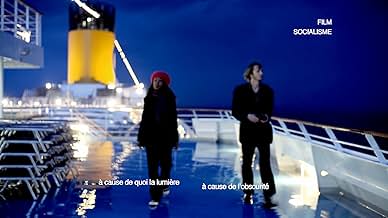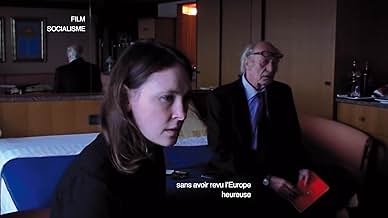Film socialisme
- 2010
- Tous publics
- 1h 42min
NOTE IMDb
5,7/10
3 k
MA NOTE
Les passagers d'une croisière en Méditerranée profitent de leur luxe tandis qu'une petite famille se bat contre l'attention excessive des médias.Les passagers d'une croisière en Méditerranée profitent de leur luxe tandis qu'une petite famille se bat contre l'attention excessive des médias.Les passagers d'une croisière en Méditerranée profitent de leur luxe tandis qu'une petite famille se bat contre l'attention excessive des médias.
- Réalisation
- Scénario
- Casting principal
- Récompenses
- 5 victoires et 2 nominations au total
Agatha Couture
- Alissa (segment "Des choses comme ça")
- (as A. Couture)
Mathias Domahidy
- Mathias (segment "Des choses comme ça")
- (as M. Domahidy)
Quentin Grosset
- Ludovic (segment "Des choses comme ça")
- (as Q. Grosset)
Maurice Sarfati
- (segment "Des choses comme ça")
- (as M. Sarfati)
Nadège Beausson-Diagne
- Constance (segment "Des choses comme ça")
- (as N. Beausson)
Dominique Devals
- (segment "Des choses comme ça")
- (as D. Devals)
Marine Battaggia
- Florine "Flo" Martin (segment "Quo vadis Europa")
- (as M. Battaggia)
Avis à la une
I'll admit that I've only seen a handful of Jean-Luc Godard's movies. "Film socialisme" is the latest. Very bizarre movie. In fact, it doesn't really emphasize a plot. It's hard to tell what the movie's emphasis is supposed to be, with the focus on a group of people aboard a cruise ship in the Mediterranean. Maybe Godard wanted to address the use of certain places as tourist meccas, but I couldn't be certain. With current events in the world, it's probably significant that the movie includes Palestine.
I'd like to see the rest of Godard's movies, but I doubt that I'll ever be able to truly understand what sort of point he was trying to make with this one.
Watch for singer-songwriter Patti Smith in a brief appearance.
I'd like to see the rest of Godard's movies, but I doubt that I'll ever be able to truly understand what sort of point he was trying to make with this one.
Watch for singer-songwriter Patti Smith in a brief appearance.
Far to be a Godard admirer, I was real seduced by this film, a mix of cultural references about Mediteranean area, a good pledge for language as obstacle of understanding, eccentric, innovative, absurd in essence, proposing characters and theirs memories and believes , but not exactly a story.
A film about time and masks and past and facts as pieces of puzzle , it is a provocative invitation to viewer to create his explanations or - and doubts.
For me, the old watch is the main scene defining this film who remains a clash by fragments of doczmentary, stains of kitsch and rediscover of past. All, in essence, in the most honest manner.
A film about time and masks and past and facts as pieces of puzzle , it is a provocative invitation to viewer to create his explanations or - and doubts.
For me, the old watch is the main scene defining this film who remains a clash by fragments of doczmentary, stains of kitsch and rediscover of past. All, in essence, in the most honest manner.
Steve Pulaskie's negative review of "Film Socialisme" inadvertently, by its very length and detail, betrays the fascination a good Godard can exert even on the "unimpressed." I'll let the positive reviews -- not all of which I have read -- speak to my own liking for this film. I need to see it more times, especially after my French is more fluent than it is. But my take is that "Film Socialisme" is meant to provoke thought and questions, not answer them ... notwithstanding one can pick up a good notion of where Godard is coming from. But -- to echo any other reviews that have said the same -- "Film Socialisme" should NEVER be anyone's introduction to Godard! Whether or not it's really his last film, it comes 50+ years after his first films blew up the way everyone made movies ... and, yes, they even have plots. I have seen only a few of them, but am buying up more. The main IMDb web-page features a number of fans listing their top Godards; I refer newbies to them. By all means see "A bout de soufflé," "Une femme est une femme," "Alphaville," "Pierrot le Fou," "Band of Outsiders," and maybe "Weekend" -- and only then try "Film Socialisme." But this last film shows me Godard hasn't lost a thing he started with. He still has all his outrageous playful inventiveness, exuberant effrontery: he still makes a movie MOVE; this film is more CINEMA than the most CINEMA flick he ever tossed off. See the early ones -- on which his rep will always rest -- then re-see this one. Whether you like "Film Socialisme" or not, you'll know what I mean.
Jean-Luc Godard is a reference in cinema and changed the art fifty years ago with a unique challenging style that defied current esthetics and etiquette.
His latest work can be described more as an eclectic experiment than any enduring piece of cinema, but it serves to show his mastery of the art and his ability to dissect it in its most basic components before trying to create a different, distinct experience for the viewer. He plays with themes, locations, styles and intermingles with little restriction photos, videos, ambient sounds, silence, music, narrations, monologues, dialogues to delves into a dream-like undefined cinematic discussion.
The film does not quite work as a whole, precisely from this lack of focus, but some of the imagery (some sharp and some out of focus, some old and some new, some seemingly meaningless and some full of allegories, etc.), dialogues (existential, simple, social, revolutionary) and intertitles do reach a cord and will be remembered subconsciously or consciously. It's lack of clear content or continuity should not take away from it's task of deconstruction and desire to destabilise our current comforts. In that aspect, Godard grabs the rug under conventional cinema and pulls very hard to make it topple over dumbfounded and confused.
There are three segments, each shorter than the previous, but besides being glad to finally leave this seemingly derelict boat and to briefly know a fictional philosophising family, there is not enough distinction between the segments to warrant further feedback at this point. Only that as Godard's life perhaps, and exemplified in the crafty ancient time-telling device in segment #2, time is getting shorter...
Maybe we'll get it right some day, may be one of many messages of this remue-méninges.
His latest work can be described more as an eclectic experiment than any enduring piece of cinema, but it serves to show his mastery of the art and his ability to dissect it in its most basic components before trying to create a different, distinct experience for the viewer. He plays with themes, locations, styles and intermingles with little restriction photos, videos, ambient sounds, silence, music, narrations, monologues, dialogues to delves into a dream-like undefined cinematic discussion.
The film does not quite work as a whole, precisely from this lack of focus, but some of the imagery (some sharp and some out of focus, some old and some new, some seemingly meaningless and some full of allegories, etc.), dialogues (existential, simple, social, revolutionary) and intertitles do reach a cord and will be remembered subconsciously or consciously. It's lack of clear content or continuity should not take away from it's task of deconstruction and desire to destabilise our current comforts. In that aspect, Godard grabs the rug under conventional cinema and pulls very hard to make it topple over dumbfounded and confused.
There are three segments, each shorter than the previous, but besides being glad to finally leave this seemingly derelict boat and to briefly know a fictional philosophising family, there is not enough distinction between the segments to warrant further feedback at this point. Only that as Godard's life perhaps, and exemplified in the crafty ancient time-telling device in segment #2, time is getting shorter...
Maybe we'll get it right some day, may be one of many messages of this remue-méninges.
A Jean-Luc Godard double feature for me this evening. The first was Alphaville. This film, reported to be Godard's last, is a far cry from that.
It was shot entirely in digital, and the colors are breathtaking. It was meant to be seen in the theater, according to Godard, but I had to settle for video. There are numerous technical "glitches" in the film, and they were meant to be there.
Most of the film's text is in French with a smattering of German, Russian, Arabic, Hebrew, Latin, and Greek. Godard added subtitles in what he termed "Navajo English" at the bottom of the frame, which were as unhelpful as they were meant to be. The film is about a failure to communicate.
This is one of those films where the critics are far more enamored than the general populace. It is considered one of the top films of 2011 - almost the top ten. The people would disagree.
It was shot entirely in digital, and the colors are breathtaking. It was meant to be seen in the theater, according to Godard, but I had to settle for video. There are numerous technical "glitches" in the film, and they were meant to be there.
Most of the film's text is in French with a smattering of German, Russian, Arabic, Hebrew, Latin, and Greek. Godard added subtitles in what he termed "Navajo English" at the bottom of the frame, which were as unhelpful as they were meant to be. The film is about a failure to communicate.
This is one of those films where the critics are far more enamored than the general populace. It is considered one of the top films of 2011 - almost the top ten. The people would disagree.
Le saviez-vous
- AnecdotesThe film did not include traditional English language subtitles for releases in countries that spoke such language. Instead, the subtitles were in "Navajo English", a translation that baffled many critics and audience members.
- GaffesSomeone claims that Napoleon founded the Comédie-Française in 1812 in Moscow. Actually, it was founded in 1680 by Louis XIV.
- Citations
Rebecca (segment "Des choses comme ça"): [dialogue continuity] You're absolutely right: I don't love any "people." Not French, not North American, not German. Not Jewish people, not black people. I love only my friends... When there are any.
- ConnexionsEdited from Le cuirassé Potemkine (1925)
- Bandes originalesMamita mia
Performed by Ernst Busch
Meilleurs choix
Connectez-vous pour évaluer et suivre la liste de favoris afin de recevoir des recommandations personnalisées
- How long is Film socialisme?Alimenté par Alexa
Détails
- Date de sortie
- Pays d’origine
- Site officiel
- Langues
- Aussi connu sous le nom de
- Film Socialism
- Lieux de tournage
- Sociétés de production
- Voir plus de crédits d'entreprise sur IMDbPro
Box-office
- Montant brut aux États-Unis et au Canada
- 42 925 $US
- Week-end de sortie aux États-Unis et au Canada
- 4 526 $US
- 5 juin 2011
- Montant brut mondial
- 222 079 $US
Contribuer à cette page
Suggérer une modification ou ajouter du contenu manquant
























